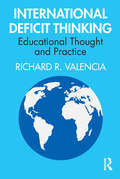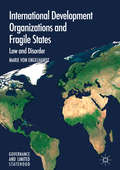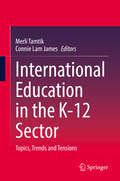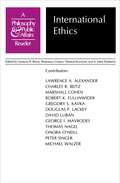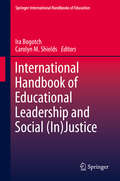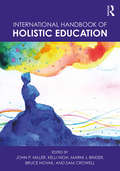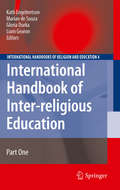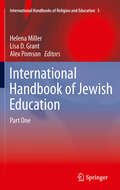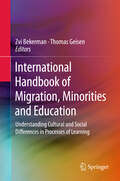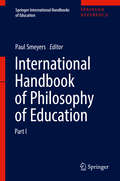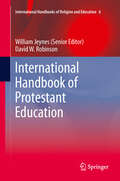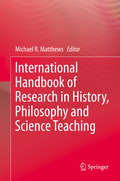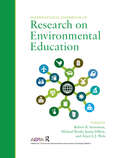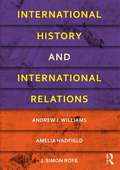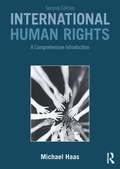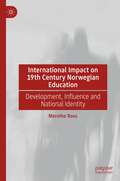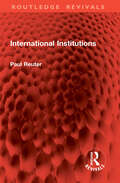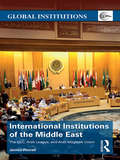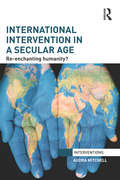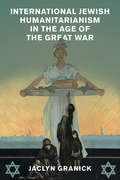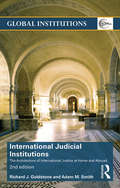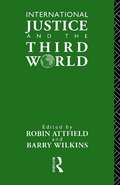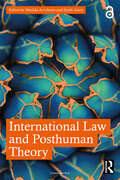- Table View
- List View
International Deficit Thinking: Educational Thought and Practice
by Richard R. ValenciaInternational Deficit Thinking: Educational Thought and Practice explores the incontrovertible reality of the persistent and pervasive academic achievement gap in many countries between marginalized students (primarily of color) and their economically advantaged White counterparts. For example, International Deficit Thinking discusses the cases of low-socioeconomic Black and Mexican American students in the United States, Indigenous Māori students in New Zealand, and immigrant Moroccan and Turkish pupils in Belgium. The predominant theoretical perspective that has been advanced to explain the school failure of marginalized students is the deficit thinking paradigm—a parsimonious, endogenous, and pseudoscientific model that blames such students as the makers of their own school failure. Deficit thinking asserts that the low academic achievement of many marginalized students is due to their limited intellectual ability, poor academic achievement motivation, and being raised in dysfunctional families and cultures. Drawing from, in part, critical race theory, systemic inequality analysis, and colonialism/postcolonialism, award-winning author and scholar Richard R.Valencia examines deficit thinking in education in 16 countries (e.g., Canada; Peru, Australia; England; India; South Africa). He seeks to (a) document and debunk deficit thinking as an interpretation for school failure of marginalized students; (b) offer scientifically defensible counternarratives for race-, class-, language-, and gender-based differences in academic achievement; (c) provide suggestions for workable and sustainable school reform for marginalized students.
International Development Organizations and Fragile States
by Marie Von EngelhardtThis book addresses a conundrum for the international development community: The law of development cooperation poses major constraints on delivering aid where it is needed most. The existence of a state with an effective government is a basic condition for the transfer of aid, making development cooperation with 'fragile' nations particularly challenging. The author explores how international organizations like the World Bank have responded by adopting formal and informal rules to engage specifically with countries with weak or no governments. Von Engelhardt provides a critical analysis of the discourse on fragile states and how it has shaped the policy decision-making of international organizations. By demonstrating how perceptions of fragility can have significant consequences both in practice and in law, the work challenges conventional research that dismisses state fragility as a phenomenon beyond law. It also argues that the legal parameters for effective global policy play a crucial role, and offers a fresh approach to a topic that is central to international security and development.
International Education in the K-12 Sector: Topics, Trends and Tensions
by Merli Tamtik Connie Lam JamesThis edited volume focuses on K-12 international education in a global context and examines trends, emerging topics, and prevalent tensions. It considers the rapidly growing phenomenon across a variety of country contexts in a way that can convey both empirical evidence and insights into theorization and practical debates. Contributors touch upon a range of emerging trends in K-12 international education globally, including student mobility, curriculum design, language learning, methodological considerations, and policy considerations through a holistic and comprehensive approach. The book also applies a critical decolonial lens in examining K-12 international education by inviting readers to think critically about issues of power, privilege, equity, and social justice in trying to foster a more informed and socially responsible approach to international education. Ultimately, the book attempts to move beyond a one-size-fits-all approach in order to embrace the complexity of issues that emerge from international education involving vulnerable populations. The book is grounded in institutional theory, which allows to explore the complex web of institutional norms, values, and behaviors that are shaping the experiences through international education across the different chapters in this volume. As an edited volume, authored by academic experts and practitioners from around the world, this book provides the most recent and up-to-date account on documenting developments related to K-12 international education internationally. Through contributing significant evidence across international contexts, the book raises new questions and offers new perspectives to the field, opening conversations both within and across governments and non-governmental stakeholders such as educators, students and parents.
International Ethics: A Philosophy and Public Affairs Reader (Philosophy and Public Affairs Readers #3)
by Lawrence A. AlexanderThis book is comprised of essays previously published in Philosophy & Public Affairs and also an extended excerpt from Michael Walzer's Just and Unjust Wars.
International Fascism, 1919-45 (Totalitarianism Movements and Political Religions)
by Robert MallettThe essays that comprise this study of 20th-century fascism shift the focus away from the German and Italian models and towards the influence of fascist ideology within other countries.
International Handbook of Educational Leadership and Social (In)Justice
by Ira Bogotch Carolyn M. ShieldsThe International Handbook on Educational Leadership and Social (In)Justice creates a first-of-its-kind international forum on conceptualizing the meanings of social justice and leadership, research approaches in studying social justice and combating social injustices, school, university and teacher leadership for social justice, advocacy and advocates for social justice, socio-cultural representations of social injustices, glocal policies, and leadership development as interventions. The Handbook is as much forward-looking as it is a retrospective review of educational research literatures on social justice from a variety of educational subfields including educational leadership, higher education academic networks, special education, health education, teacher education, professional development, policy analyses, and multicultural education. The Handbook celebrates the promises of social justice while providing the educational leadership research community with concrete, contextualized illustrations on how to address inequities and combat social, political and economic injustices through the processes of education in societies and educational institutions around the world.
International Handbook of Holistic Education
by John P. Miller Marni J. Binder Kelli Nigh Bruce Novak Sam CrowellProviding a comprehensive overview of holistic education’s history, conceptions, practices, and research, this Handbook presents an up-to-date, global picture of the field. Organized in five sections, the Handbook lays out the field’s theoretical and historical foundations; offers examples of holistic education in practice with regard to schools, programs, and pedagogies at all levels; presents research methods used in holistic education; outlines the growing effort among holistic educators to connect holistic teaching and learning with research practice; and examines present trends and future areas of interest in program development, inquiry, and research. This volume is a must-have resource for researchers and practitioners and serves as an essential foundational text for courses in the field.
International Handbook of Inter-religious Education
by Kath Engebretson Gloria Durka Marian De Souza Liam GearonThis Handbook has the potential to redress the distortion of information about particular religions, to add to understanding about what religions have in common, and to suggest how they can work together for justice and peace. In the present day there is a vital resurgence of interest in religions, with new movements emerging from long established religious traditions. There is also, around the world, a growing sense of the need to preserve indigenous religions, even when these have accommodated to imported traditions. The Handbook gives a voice to this resurgence of interest, and addresses inter-religious education from a range of religious viewpoints and contexts. The publication is very timely especially in light of the need for religions of the world to together contemplate and actively promote human rights, social justice and peace, for religions have a specific mandate for this.
International Handbook of Jewish Education
by Alex Pomson Lisa D. Grant Helena MillerThe International Handbook of Jewish Education, a two volume publication, brings together scholars and practitioners engaged in the field of Jewish Education and its cognate fields world-wide. Their submissions make a significant contribution to our knowledge of the field of Jewish Education as we start the second decade of the 21st century. The Handbook is divided broadly into four main sections: Vision and Practice: focusing on issues of philosophy, identity and planning -the big issues of Jewish Education.Teaching and Learning: focusing on areas of curriculum and engagementApplications, focusing on the ways that Jewish Education is transmitted in particular contexts, both formal and informal, for children and adults.Geographical, focusing on historical, demographic, social and other issues that are specific to a region or where an issue or range of issues can be compared and contrasted between two or more locations.This comprehensive collection of articles providing high quality content, constitutes a difinitive statement on the state of Jewish Education world wide, as well as through a wide variety of lenses and contexts. It is written in a style that is accessible to a global community of academics and professionals.
International Handbook of Migration, Minorities and Education
by Zvi Bekerman Thomas GeisenMigrants and minorities are always at risk of being caught in essentialized cultural definitions and being denied the right to express their cultural preferences because they are perceived as threats to social cohesion. Migrants and minorities respond to these difficulties in multiple ways -- as active agents in the pedagogical, political, social, and scientific processes that position them in this or that cultural sphere. On the one hand, they reject ascribed cultural attributes while striving towards integration in a variety of social spheres, e.g. school and workplace, in order to achieve social mobility. On the other hand, they articulate demands for cultural self-determination. This discursive duality is met with suspicion by the majority culture. For societies with high levels of migration or with substantial minority cultures, questions related to the meaning of cultural heterogeneity and the social and cultural limits of learning and communication (e.g. migration education or critical multiculturalism) are very important. It is precisely here where the chances for new beginnings and new trials become of great importance for educational theorizing, which urgently needs to find answers to current questions about individual freedom, community/cultural affiliations, and social and democratic cohesion. Answers to these questions must account for both 'political' and 'learning' perspectives at the macro, mezzo, and micro contextual levels. The contributions of this edited volume enhance the knowledge in the field of migrant/minority education, with a special emphasis on the meaning of culture and social learning for educational processes.
International Handbook of Philosophy of Education (Springer International Handbooks of Education)
by Paul SmeyersThis handbook presents a comprehensive introduction to the core areas of philosophy of education combined with an up-to-date selection of the central themes. It includes 95 newly commissioned articles that focus on and advance key arguments; each essay incorporates essential background material serving to clarify the history and logic of the relevant topic, examining the status quo of the discipline with respect to the topic, and discussing the possible futures of the field. The book provides a state-of-the-art overview of philosophy of education, covering a range of topics: Voices from the present and the past deals with 36 major figures that philosophers of education rely on; Schools of thought addresses 14 stances including Eastern, Indigenous, and African philosophies of education as well as religiously inspired philosophies of education such as Jewish and Islamic; Revisiting enduring educational debates scrutinizes 25 issues heavily debated in the past and the present, for example care and justice, democracy, and the curriculum; New areas and developments addresses 17 emerging issues that have garnered considerable attention like neuroscience, videogames, and radicalization. The collection is relevant for lecturers teaching undergraduate and graduate courses in philosophy of education as well as for colleagues in teacher training. Moreover, it helps junior researchers in philosophy of education to situate the problems they are addressing within the wider field of philosophy of education and offers a valuable update for experienced scholars dealing with issues in the sub-discipline. Combined with different conceptions of the purpose of philosophy, it discusses various aspects, using diverse perspectives to do so. Contributing Editors:Section 1: Voices from the Present and the Past: Nuraan DavidsSection 2: Schools of Thought: Christiane Thompson and Joris VliegheSection 3: Revisiting Enduring Debates: Ann Chinnery, Naomi Hodgson, and Viktor JohanssonSection 4: New Areas and Developments: Kai Horsthemke, Dirk Willem Postma, and Claudia Ruitenberg
International Handbook of Protestant Education
by William Jeynes David W. RobinsonSince their earliest days, institutions providing a Protestant education have always been respected and sought-after for their rigor and relative freedom from dogma--and despite today's secularism and plurality, they remain so. This international handbook is the ultimate companion to protestant schooling worldwide. Its 39 chapters form the most comprehensive and wide-ranging treatment of the subject yet available, addressing Protestant education on all six inhabited continents and featuring the perspectives of leading authorities and public figures. The contributions cover in detail not only the facts and features of Protestant schooling in sundry nations, but also integrate a range of themes common to them all, themes so vital that they are of central concern to Christians around the world and of whatever denomination. Some of these topics are school choice, globalization, Bible pedagogy and character education, the fine arts, parental involvement, and the rise of Christianity in previously inaccessible locations such as China. The handbook's stellar list of authors is a Who's Who of authorities on the subject and includes a renowned American evangelical, a former historian of the US House of Representatives, and White House consultants responsible for framing legislation. The many contributors from outside the USA are leading academics conducting seminal research on numerous topics in the field. Both exhaustive and authoritative, The International Handbook of Protestant Educationwill be an invaluable asset to educators, ministers, parents, policy makers political leaders of any denomination--or none.
International Handbook of Research in History, Philosophy and Science Teaching
by Michael R. MatthewsThis inaugural handbook documents the distinctive research field that utilizes history and philosophy in investigation of theoretical, curricular and pedagogical issues in the teaching of science and mathematics. It is contributed to by 130 researchers from 30 countries; it provides a logically structured, fully referenced guide to the ways in which science and mathematics education is, informed by the history and philosophy of these disciplines, as well as by the philosophy of education more generally. The first handbook to cover the field, it lays down a much-needed marker of progress to date and provides a platform for informed and coherent future analysis and research of the subject. The publication comes at a time of heightened worldwide concern over the standard of science and mathematics education, attended by fierce debate over how best to reform curricula and enliven student engagement in the subjects. There is a growing recognition among educators and policy makers that the learning of science must dovetail with learning about science; this handbook is uniquely positioned as a locus for the discussion. The handbook features sections on pedagogical, theoretical, national, and biographical research, setting the literature of each tradition in its historical context. It reminds readers at a crucial juncture that there has been a long and rich tradition of historical and philosophical engagements with science and mathematics teaching, and that lessons can be learnt from these engagements for the resolution of current theoretical, curricular and pedagogical questions that face teachers and administrators. Science educators will be grateful for this unique, encyclopaedic handbook, Gerald Holton, Physics Department, Harvard University This handbook gathers the fruits of over thirty years' research by a growing international and cosmopolitan community Fabio Bevilacqua, Physics Department, University of Pavia
International Handbook of Research on Environmental Education
by Justin Dillon Robert B. Stevenson Michael Brody Arjen E.J. WalsThe environment and contested notions of sustainability are increasingly topics of public interest, political debate, and legislation across the world. Environmental education journals now publish research from a wide variety of methodological traditions that show linkages between the environment, health, development, and education. The growth in scholarship makes this an opportune time to review and synthesize the knowledge base of the environmental education (EE) field. The purpose of this 51-chapter handbook is not only to illuminate the most important concepts, findings and theories that have been developed by EE research, but also to critically examine the historical progression of the field, its current debates and controversies, what is still missing from the EE research agenda, and where that agenda might be headed. Published for the American Educational Research Association (AERA).
International History and International Relations
by J. Simon Rofe Andrew J. Williams Amelia HadfieldThis innovative new textbook seeks to provide undergraduate students of international relations with valuable and relevant historical context, bridging the gap and offering a genuinely interdisciplinary approach. Each chapter integrates both historical analysis and literature and applies this to an international relations context in an accessible fashion, allowing students to understand the historical context in which these core issues have developed. The book is organised thematically around the key issues in international relations such as war, peace, sovereignty, identity, empire and international organisations. Each chapter provides an overview of the main historical context, theories and literature in each area and applies this to the study of international relations. Providing a fresh approach, this work will be essential reading for all students of international relations and international relations theory.
International Human Rights: A Comprehensive Introduction
by Michael HaasThis book provides a comprehensive introduction to international human rights -- international human rights law, why international human rights have increasingly risen to world prominence, what is being done about violations of human rights, and what might be done to further promote the cause of international human rights so that everyone may one day have their rights respected regardless of who they are or where they live. It explains: how the concept of international human rights has developed over time the variety of types of human rights (civil-political rights, economic-social rights, as well as a delineation of war crimes) empirical findings from statistical research on human rights institutional efforts to promote human rights an extensive listing of international human rights agreements identification of recent prosecutions of war criminals in domestic and international tribunals ongoing efforts to promote human rights through international aid programs the newest dimensions in the field of human rights (gay rights, animal rights, environmental rights). Richly illustrated throughout with case studies, controversies, court cases, think points, historical examples, biographical statements, and suggestions for further reading, International Human Rights is the ideal introduction for all students of human rights. The book will also be useful for human rights activists to learn how and where to file human rights complaints in order to bring violators to justice. The new edition is fully updated and includes new material on: the Obama presidency the Arab Spring and its aftermath the workings of the International Criminal Court quantitative analyses of human rights war crimes.
International Human Rights: Universalism Versus Relativism (Frontiers of Anthropology #6)
by Alison Dundes RentelnThe universality of international human rights has been an enduring issue. This volume argues that the positions of universalists and cultural relativists are not diametrically opposed and that it is possible to demonstrate, empirically and cross-culturally, the existence of worldwide human rights.
International Impact on 19th Century Norwegian Education: Development, Influence and National Identity
by Merethe RoosThis book examines Norwegian education throughout the course of the 19th century, and discusses its development in light of broader transnational impulses. The nineteenth century is regarded as a period of increasing national consciousness in Norway, pointing forward to the political independency that the country was granted in 1905. Education played an important role in this process of nationalisation: the author posits that transnational – for the most part Scandinavian – impulses were more decisive for the development of Norwegian education than has been acknowledged in previous research. Drawing on the work of educator and school bureaucrat Hartvig Nissen, who is recognised as the most important educational strategist in 19th century Norway, this book will be of interest to scholars of the history of education and Norwegian education more generally.
International Institutions (Routledge Revivals)
by Paul ReuterOriginally published in 1958, this book assesses the continuity and variety of international societies as they have existed in recent history. Although the study of international institutions is firmly based on a foundation of law, this book also encompasses sociology, history and politics. The introduction defines the elements of international society in terms of the accepted principles of group psychology. Part 1 considers the origins of 20th Century international institutions. This historical analysis runs from the ancient civilizations through to the greatly changed relations which followed World War II. The general notions and sources of international law are then examined. Part 2 deals with the structure of day-to-day relations between States and the means of recognizing changes within a State. The United Nations and principal regional organizations are also examined.
International Institutions of the Middle East: The GCC, Arab League, and Arab Maghreb Union (Global Institutions)
by James WorrallThis volume is a key text for understanding the major regional international organizations of the Middle East. Analysing the Arab League, the Gulf Cooperation Council, and the Arab-Maghreb Union in a concise and accessible format, it explores their successes and failures across their full range of activities (economic, social, and political), while contextualising the reasons why many consider that these organizations have stalled.The book:- assesses the reasons why IOs in the Middle East are under-developed relative to neighbouring regional organizations;- explores their history, evolution, and structure, while considering the successes and failures of each IO;- analyses the reasons for the specific difficulties faced by each organization through the context of intra-regional relations;- develops a new framework for analysing the forces that have shaped these bodies and challenges the existing narrative that largely ignores the achievements and prospects of the organizations;- considers the likely impact of the Arab Spring upon the future development of these frequently overlooked regional international organizations.This book will be of great interest to students and scholars of Middle East studies, international organizations, and global governance, as well as diplomats and policymakers
International Intervention in a Secular Age: Re-Enchanting Humanity? (Interventions)
by Audra MitchellInternational intervention is not just about ‘saving’ human lives: it is also an attempt to secure humanity’s place in the universe. This book explores the Western secular beliefs that underpin contemporary practices of intervention—most importantly, beliefs about life, death and the dominance of humanity. These beliefs shape a wide range of practices: the idea that human beings should intervene when human lives are at stake; analyses of violence and harm; practices of intervention and peace-building; and logics of killing and letting die. Ironically, however, the Western secular desire to ensure the meaningfulness of human life at all costs contributes to processes of dehumanization, undercutting the basic goals of intervention. To explore this paradox, International Intervention in a Secular Age engages with examples from around the world, and draws on interdisciplinary sources: anthropologies of secularity and IR, posthumanist political philosophy, ontology and the sociology of death. This book offers new insight into perennial problems, such as the reluctance of intervenors to incur fatalities, and international inaction in the face of escalating violence. It also exposes new dilemmas, such as the dehumanizing effects of quantifying casualties, Western secular logics of killing, and the appropriation of lives and deaths through peace-building processes. It will be of great interest to students and scholars of international relations, political philosophy, international ethics and social anthropology.
International Jewish Humanitarianism in the Age of the Great War (Human Rights in History)
by Jaclyn GranickIn 1914, seven million Jews across Eastern Europe and the Eastern Mediterranean were caught in the crossfire of warring empires in a disaster of stupendous, unprecedented proportions. In response, American Jews developed a new model of humanitarian relief for their suffering brethren abroad, wandering into American foreign policy as they navigated a wartime political landscape. The effort continued into peacetime, touching every interwar Jewish community in these troubled regions through long-term refugee, child welfare, public health, and poverty alleviation projects. Against the backdrop of war, revolution, and reconstruction, this is the story of American Jews who went abroad in solidarity to rescue and rebuild Jewish lives in Jewish homelands. As they constructed a new form of humanitarianism and re-drew the map of modern philanthropy, they rebuilt the Jewish Diaspora itself in the image of the modern social welfare state.
International Judicial Institutions: The architecture of international justice at home and abroad (Global Institutions)
by Richard J. Goldstone Adam M. SmithThis fully-updated and much expanded second edition provides a much needed, short and accessible introduction to the current debates in international humanitarian law. Written by a former UN Chief Prosecutor and a leading international law expert, this book analyses the legal and political underpinnings of international judicial institutions, it provides the reader with an understanding of both the historical development of institutions directed towards international justice, as well as an overview of the differences and similarities between such organizations. New to this edition: New updates on recently found records of the United Nations War Crimes Commission. Updates on the recent judicial decisions of the International Criminal Tribunal for the former Yugoslavia and International Criminal Tribunal for Rwanda Updates on the Special Tribunal For Lebanon A re-evaluation of the future of the International Criminal Court International Judicial Institutions: Second Edition will be of great interest to students of International Politics, Criminology and Law.
International Justice and the Third World: Studies in the Philosophy of Development
by Robin Attfield Barry WilkinsInternational Justice and the Third World vindicates belief in global or universal justice, and explores both liberal and Marxist grounds for such belief. It also investigates the presuppositions of belief in development, and relates it to sustainability, to environmentalism, and to the obligation to cancel Third World debt.
International Law and Posthuman Theory
by Emily Jones Matilda ArvidssonAssembling a series of voices from across the field, this book demonstrates how posthuman theory can be employed to better understand and tackle some of the challenges faced by contemporary international law. With the vast environmental devastation being caused by climate change, the increasing use of artificial intelligence by international legal actors and the need for international law to face up to its colonial past, international law needs to change. But in regulating and preserving a stable global order in which states act as its main subjects, the traditional sources of international law – international legal statutes, customary international law, historical precedents and general principles of law – create a framework that slows down its capacity to act on contemporary challenges, and to imagine futures yet to come. In response, this collection maintains that posthuman theory can be used to better address the challenges faced by contemporary international law. Covering a wide array of contemporary topics – including environmental law, the law of the sea, colonialism, human rights, conflict and the impact of science and technology – it is the first book to bring new and emerging research on posthuman theory and international law together into one volume. This book’s posthuman engagement with central international legal debates, prefaced by the leading scholar in the field of posthuman theory, provides a perfect resource for students and scholars in international law, as well as critical and socio-legal theorists and others with interests in posthuman thought, technology, colonialism and ecology.
